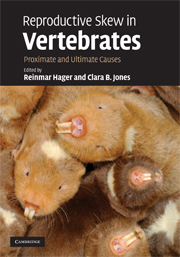Book contents
- Frontmatter
- Contents
- List of contributors
- Foreword
- Preface
- Part I Reproductive skew theory
- Part II Testing assumptions and predictions of skew models
- Part III Resolving reproductive conflicts: behavioral and physiological mechanisms
- Part IV Future directions
- 15 Understanding variation in reproductive skew: directions for future empirical research
- 16 On the evolution of reproductive skew: a genetical view
- 17 Social conflict resolution, life history, and the reconstruction of skew
- Taxonomic index
- Subject index
16 - On the evolution of reproductive skew: a genetical view
from Part IV - Future directions
Published online by Cambridge University Press: 02 February 2010
- Frontmatter
- Contents
- List of contributors
- Foreword
- Preface
- Part I Reproductive skew theory
- Part II Testing assumptions and predictions of skew models
- Part III Resolving reproductive conflicts: behavioral and physiological mechanisms
- Part IV Future directions
- 15 Understanding variation in reproductive skew: directions for future empirical research
- 16 On the evolution of reproductive skew: a genetical view
- 17 Social conflict resolution, life history, and the reconstruction of skew
- Taxonomic index
- Subject index
Summary
Summary
Prevailing reproductive-skew theory is dominated by a game-theoretic approach to modeling optimal behavior. This approach has led to the development of many specific model variants exploring the evolutionary causes of reproductive partitioning in animal groups as well as motivating the empirical investigation of specific model predictions. Here, we discuss a novel quantitative genetics view of the evolution of reproductive skew, where individual reproductive success and associated phenotypic traits are influenced by genetic interactions amongst social consorts. We first briefly review empirical evidence of genetic variation and constraints on social phenotypes relating to reproductive skew. Second, we develop a biological argument for viewing reproductive skew as the result of social competition and discuss potential gains of using a genetic framework to investigate social evolution. Finally, we describe general predictions and outline a program of study for investigating reproductive skew in this context. We hope that this fresh perspective on the evolution of reproductive skew offers ample scope for exciting future research complementing existing theory. In particular a genetical approach allows posing and investigating questions that could not be answered using traditional game-theory models, for example about past selection patterns, the evolutionary scope for traits that affect skew, and thus the range of behavioral strategies available to group members. Applying a quantitative-genetics approach to understanding patterns of reproductive skew may ultimately yield additional insights into the evolution of sociality.
The optimal skew
An enduring problem in biology has been to explain the evolutionary transition from the solitary lifestyle to that of animal societies (Maynard-Smith & Szathmary 1995). One approach to understanding the evolution of social groups is to investigate the sharing of reproductive benefits amongst group members.
- Type
- Chapter
- Information
- Reproductive Skew in VertebratesProximate and Ultimate Causes, pp. 467 - 479Publisher: Cambridge University PressPrint publication year: 2009
- 3
- Cited by



